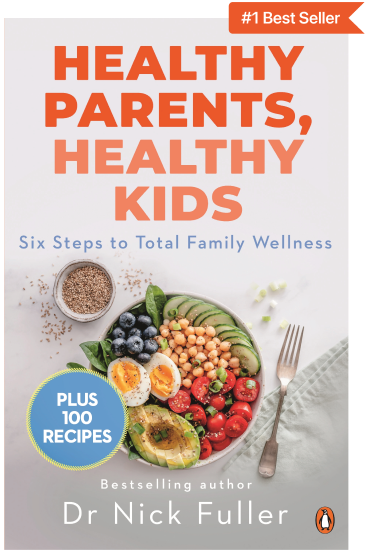Nutritional Supplements for Picky Eaters: A Practical Guide to Ensure Proper Nutrition

Dr Nick Fuller
Leading Obesity Expert at the University of Sydney and founder of Interval Weight Loss.

If your kid’s idea of a balanced meal is plain pasta, chicken nuggets, or crackers, you’re definitely not alone. Research shows that almost 50% of children go through a picky eating phase, leaving parents wondering if they’re actually getting the good stuff. While we’d love for them to eat a rainbow of veggies, supplements can help fill in the gaps and keep them growing strong.
In this blog, we will discuss how supplements can complement your child’s health, explore the best options, and share tips to make them part of your routine. Let us take the stress out of mealtimes and focus on their wellbeing!
Worried About Nutrition for Your Picky Eater? Here’s the Answer!
Getting your picky eater the nutrients they need doesn’t have to be overwhelming. Healthy Parents, Healthy Kids by Dr Nick Fuller, one of Australia’s leading childhood nutrition experts, offers simple, effective solutions for supporting your child’s health. This guide is packed with expert tips on choosing the right nutritional supplements to complement their diet.
Say goodbye to the stress of dietary gaps and hello to confident choices that help your child thrive. With Healthy Parents, Healthy Kids, you will discover how to support your picky eater’s nutrition without the mealtime struggles. Get your copy today!
Importance of Nutritional Supplements for Picky Eaters
Being choosy with food can sometimes mean missing out on key vitamins and minerals that are important for growing bodies and busy brains. Studies have shown that kids who shy away from meat, fruits, or veggies might not get enough iron or zinc—nutrients that help build strong bones, keep their immune systems in tip-top shape, and support brain power.
Of course, getting those nutrients from real food is the goal, but let’s be real—sometimes that’s easier said than done. That’s where nutritional supplements come in! Think of them as a backup plan to help make sure your little one gets what they need to grow, thrive, and keep up with all their adventures.
However, supplements are not a substitute for a balanced diet but rather a complement to it. When used thoughtfully, they can support your child’s overall wellbeing while you continue to encourage and nurture healthy eating habits.
Signs Of Nutrition Deficiency
Nutritional deficiencies can be easy to miss, especially in picky eaters. However, your child’s body often sends subtle signals when it’s not getting enough essential nutrients. Recognising these signs early can help you address any gaps in their diet before they impact their growth and development. Keep an eye out for these common indicators:
- Fatigue or low energy levels
- Weakness
- Dizziness
- Poor immune function
- Delayed wound healing
- Brittle or weak bones
- Skin rashes or dry skin
- Hair loss
- Changes in or loss of appetite
- Mood changes, such as increased irritability or depression
- Menstrual irregularities
- Poor night vision or white growths on the eyes
- Bleeding gums or loose teeth
- Memory problems or cognitive difficulties
- Numbness or tingling in the hands and feet
8 Best Nutritional Supplements for Picky Eaters
Supplements can provide the essential nutrients that may be missing from your child’s limited diet, supporting their growth and overall health. Here are the top supplements to consider for picky eaters and how they can benefit your child:
1. Multivitamins
If you are looking for an easy way to help your picky eater get the nutrients they need, multivitamins are a great place to start. They pack a punch with key nutrients like vitamin A, vitamin C, and zinc. Pick age-appropriate options that skip the artificial colors and flavors. And if gummies are your go-to, just keep an eye on how many they’re munching—those tasty little bites can add up.
2. Vitamin D
Vitamin D plays a key role in bone health and immune function. Kids who steer clear of dairy or don’t get much sunshine might need a little extra help here. A daily dose can make sure they’re covered, especially since, according to research, vitamin D deficiency is more common than you’d think, affecting about 1 billion people worldwide.
3. Omega 3 Fatty Acids
Omega-3s, found in fish oil, are essential for brain development, focus, and heart health. Picky eaters who skip fish may benefit from supplements like DHA and EPA. These often come in liquid or chewable forms, with flavours designed to mask the taste of fish oil.
Want to make sure your child gets enough omega-3s? Check out this guide for easy, practical tips.
4. Iron
Iron supports energy levels, learning, and overall growth. Children who avoid iron-rich foods like red meat or leafy greens are at risk of deficiency, which can lead to fatigue and reduced immunity. Iron supplements come in liquid or chewable options and are best taken with vitamin C for improved absorption.
5. Calcium
Calcium is vital for strong bones and teeth, particularly during childhood. If they're not into dairy (because, well, picky eating), they might need a little extra help with supplements. Look for ones packed with vitamin D to help that calcium do its job, and maybe go for chewables or gummies—because who doesn’t love a snack disguised as a vitamin?
6. Fibre
A lack of fruits, vegetables, and whole grains can result in low fibre intake, leading to digestive issues like constipation. Fibre supplements, such as powders or gummies, can help keep your child’s digestive system running smoothly. Aim for natural, plant-based options without added sugars.
7. Probiotics
Probiotics support gut health and immunity by promoting a healthy balance of bacteria in the digestive system. They’re especially helpful if your child experiences bloating or irregular bowel movements. Available in chewable tablets, powders, or even yoghurts, probiotics are an easy addition to your routine.
8. Protein Powders
For picky eaters with limited protein intake, protein powders can help meet their needs. Choose options made from natural ingredients, such as whey or plant-based proteins, without added sugars or artificial flavours. These can be mixed into smoothies, milk, or even baked goods for a nutritional boost.
Things to Consider While Taking Nutritional Supplements
When adding nutritional supplements to your child’s routine, it’s important to do it right. Supplements should complement a balanced diet, not replace it. Here are some important considerations to keep in mind when choosing and using nutritional supplements for picky eaters.
Talk to Your Doctor First
Before jumping in, check with your healthcare professional. They can help you figure out if your child has specific nutrient gaps and recommend the best supplements and dosages. Plus, they will flag any potential issues, like interactions with medications.
Get the Dosage Right
When it comes to supplements, more isn’t always better. Overdoing nutrients like iron or vitamin D can actually be harmful. Stick to the recommended dose on the label, and use tools like pill organisers or measuring spoons for accuracy. Doses might vary depending on your child’s age or weight, so pay close attention.
Choose Quality Products
Not all supplements are created equal. Look for brands that have third-party testing certifications to make sure the product is safe and matches what’s on the label. Skip anything with unnecessary fillers, artificial additives, or sketchy ingredients. Your kid deserves the good stuff!
Check the Ingredients
Always read the label. Make sure the supplement doesn’t sneak in extra sugars, allergens, or artificial junk. If possible, go for natural versions of vitamins and minerals—they’re often better for overall health.
Watch for Interactions
Supplements can sometimes mess with how medications or other nutrients work. For example, too much calcium can block iron absorption. Double-check with your healthcare provider to avoid any unwanted side effects or less-effective treatments.
Does Your Child Actually Need It?
Not every kid needs supplements. If their diet is pretty balanced, they might already be getting everything they need. Supplements should be for filling real gaps, addressing deficiencies, or following your doctor’s advice.
Keep an Eye on Changes
After starting a supplement, monitor how your child is feeling and behaving. Any big changes? Keep your healthcare provider in the loop and adjust if needed. Regular check-ins make sure you’re hitting the sweet spot for their nutrition.
Wrapping Up
Nutriotional supplements can be a game-changer for picky eaters, helping them grow and thrive. Just remember to consult your doctor, pick high-quality products, and keep doses in check. With a thoughtful approach, supplements can be the perfect partner to a balanced diet!
Get the latest tips, pro strategies, exclusive offers, and all the support you need!
Meet Dr Nick Fuller
My Story
As a father, I know first-hand that raising healthy and happy children is tricky. Children are fussy, particularly at the end of the day when they are shattered. We also live in a society where companies seek to profit from what we feed our kids; incorrect and damaging advice is pushed on us and marketed towards our children, and we have no time.
But with these recipes and resources, you and your children can enjoy simple and well-founded food and lifestyle choices for lifelong health.

About Dr Nick Fuller
Dr Nick Fuller is the founder of Interval Weight Loss and is a leading obesity expert at the University of Sydney with a Ph.D. in Obesity Treatment. Dr Fuller is also the author of three best-selling books and his work been published in top ranked journals in the medical field, including JAMA, Lancet and American Journal of Clinical Nutrition.
